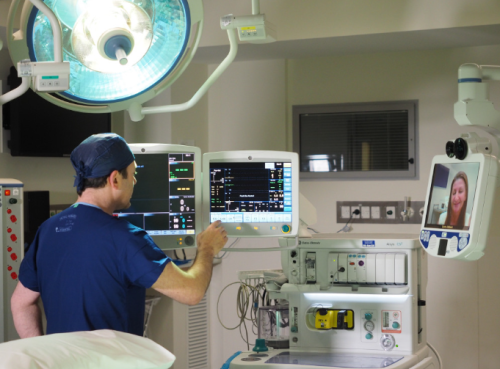In the hushed halls of the Universitario Quironsalud hospital in Madrid, there’s a new sound — the chatter of experts who are thousands of miles away helping doctors get the most out of their new high-tech diagnostic equipment.
Their voices and faces are coming through live-stream from what looks like a video monitor hanging on a moveable metal stand. From anywhere in the world, a medical specialist can deliver their expertise through the virtual onsite trainer and remotely turn the monitor 360 degrees to view machinery and personally train technicians in the room. They can zoom in and focus on the tiniest details. The monitor is also equipped with a remote laser pointer so the expert can direct the radiology technician’s hands to particular buttons on the machine or point out areas of interest. Through the monitor, they can share slides and other educational materials during the discussion.
Meet the Virtual Onsite trainer (VOT), a Wi-Fi-enabled, battery-operated mobile device that replicates face-to-face training. The system, which can be moved to any part of the hospital, is an important part of GE’s digital strategy.
As technology speeds ahead, hospitals have more and more access to cutting-edge imaging and diagnostic tools. Usually, with any new piece of equipment, an expert will come to the hospital and train the people who will be using the new technology. But too often that training isn’t enough or there is staff turnover and the people who knew how to use the machines leave.
“With this new technology, we can provide better continuous training on the latest imaging technology to our cardiologists,” says Dr. José A. Cabrera, chief of cardiology at the Madrid hospital. “We can now have much simpler and frequent access to the experts who can show us how to use the latest imaging technologies. In fact, based on our experience so far with this new solution, it’s basically as good as having the expert trainer next to us in the same room.”

Above image: New Virtual Onsite Trainers Are Helping Hospitals Get The Most Out Of New Technology – GE Reports
“With this new technology, we can provide better continuous training on the latest imaging technology to our cardiologists,” says Dr. José A. Cabrera, chief of cardiology at the Madrid hospital. Image credit: GE Healthcare
The VOT system prototype has been tested in Spain, Australia and the United States over the past 12 months. By the end of the year, 15 hospitals in the U.S. and four European hospitals will integrate the technology into everyday use.
GE Healthcare is investing more than $1 billion to train 2 million health professionals globally between 2015 and 2020. The VOT enables customers to train more people, more frequently, without requiring them to leave the hospital.
“The goal is to digitise some elements of expert training around the world while keeping highly effective hands-on live interaction,” explains Mario Lois, general manager of global education services at GE Healthcare. He says there are 1,500 GE healthcare experts globally who are now more accessible to customers than if we only relied on physically traveling to each site. “Most of our customers around the world are good at using our equipment. Now we can help them go from good to great, improving productivity and patient care,” he says. Initial concerns about healthcare providers feeling uneasy about talking to what is essentially a robot have proven unfounded. One technician compared it to having someone there to help when you first bring home a new baby.
“This technology is very exciting because it enables the humans on both ends to interact in extremely efficient ways not possible before,” Lois says.
Top image: It can be challenging for staff to keep up with new protocols and procedures and continually changing compliance requirements, GE says. On top of that, technicians have more to do and hospitals have tighter budgets, creating a real training challenge. Images credit: GE Healthcare
As an Amazon Associate, TechCity may earn a small commission if you shop these products.
















